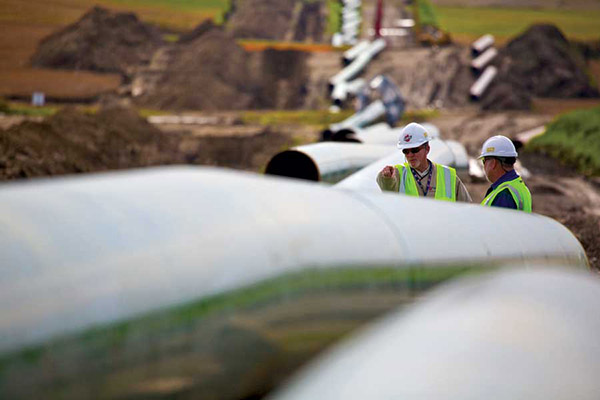US Regulator Orders Lower Pressure on Keystone Pipeline System After Spill
(Reuters) — The U.S. pipeline regulator said on Tuesday it would require TC Energy to reduce operating pressure on more than 1,000 additional miles (1,609 km) of its Keystone pipeline that spilled about 13,000 barrels of oil in rural Kansas in December.
The Canadian pipeline operator completed a controlled restart of the 622,000-barrel-per-day (bpd) pipeline to Cushing, Oklahoma, on Dec. 29 last year, returning it to service after a 21-day outage following the biggest U.S oil spill in nine years.
RELATED: Pipeline Operator TC Energy Says Stress, Weld Fault Caused Keystone Oil Spill
The company's "operating, maintenance, and/or integrity management programs may be inadequate to address the repetitious pattern of failures related to the original design, manufacture, and construction of Keystone pipeline," the Pipeline and Hazardous Materials Safety Administration (PHMSA) said in its order.
The amended corrective action order (ACAO) requires TC Energy to keep the operating pressure on the affected pipeline segment under the previously agreed upon 923 pounds per square gauge (psig) limit.
TC Energy said it was reviewing the PHMSA order and that it would comply with it.
"The Keystone Pipeline System has been operating under operational mitigations, within the pressure restrictions applied in the PHMSA ACAO, since it was returned to service," the company said in an emailed statement.
In addition, operating pressure on the rest of the pipeline extension from Steele City, Nebraska to the Cushing storage hub and on the entire 1,025-mile main line from the Canadian border to refineries in Illinois, must not exceed 72% of the specified minimum yield strength (SMYS).
This effectively amounts to a suspension of the special permit that PHMSA issued to TC Energy in 2007, allowing the pipeline to operate at a stress level of 80% of its SMYS, and the order requires TC Energy to review the pressure restriction monthly.
The pressure reductions will lower crude flow rates on the entire Keystone system, which could affect price differentials between U.S. and Canadian crude, Credit Suisse analyst Andrew Kuske said in a note.
TC Energy will also be required to submit an independently conducted root cause failure analysis, followed by a remedial work plan and proposed measures to mitigate consequences of a failure, according to the order.
The PHMSA said it issued the order without a hearing considering various factors that include "the increasing severity of spills in recent years" and "the possibility of future failures," while its investigation into the cause of the December spill was ongoing.
The Canadian company said last month that a combination of factors including bending stress on the pipe and a weld flaw might have led to the Keystone oil spill, and it expected $480 million in costs related to the incident.
It revised the discharge volume to 12,937 barrels by measuring the crude injected to refill the pipeline during its restart, while the U.S. Environmental Protection Agency said it continued to work from its independent initial estimate of 14,000 barrels.
Related News
Related News

- Kinder Morgan Proposes 290-Mile Gas Pipeline Expansion Spanning Three States
- Enbridge Plans 86-Mile Pipeline Expansion, Bringing 850 Workers to Northern B.C.
- Intensity, Rainbow Energy to Build 344-Mile Gas Pipeline Across North Dakota
- Tallgrass to Build New Permian-to-Rockies Pipeline, Targets 2028 Startup with 2.4 Bcf Capacity
- U.S. Moves to Block Enterprise Products’ Exports to China Over Security Risk
- U.S. Pipeline Expansion to Add 99 Bcf/d, Mostly for LNG Export, Report Finds
- A Systematic Approach To Ensuring Pipeline Integrity
- US Poised to Become Net Exporter of Crude Oil in 2023
- EIG’s MidOcean Energy Acquires 20% Stake in Peru LNG, Including 254-Mile Pipeline
- Enbridge Sells $511 Million Stake in Westcoast Pipeline to Indigenous Alliance





Comments